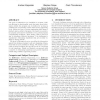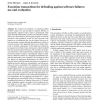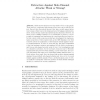264 search results - page 20 / 53 » Minimal-Latency Secure Function Evaluation |
ICSE
2005
IEEE-ACM
14 years 9 months ago
2005
IEEE-ACM
Some software defects trigger failures only when certain complex information flows occur within the software. Profiling and analyzing such flows therefore provides a potentially i...
DRM
2007
Springer
14 years 3 months ago
2007
Springer
The goal of obfuscation is to transform a program, without affecting its functionality, such that some secret information within the program can be hidden for as long as possible...
IJISEC
2006
13 years 9 months ago
2006
We examine the problem of containing buffer overflow attacks in a safe and efficient manner. Briefly, we automatically augment source code to dynamically catch stack and heap-based...
CHES
2011
Springer
12 years 9 months ago
2011
Springer
Randomness extractors are important tools in cryptography. Their goal is to compress a high-entropy source into a more uniform output. Beyond their theoretical interest, they have ...
APLAS
2010
ACM
13 years 10 months ago
2010
ACM
Abstract. We propose a flexible method for verifying the security of ML programs that use cryptography and recursive data structures. Our main applications are X.509 certificate ch...



